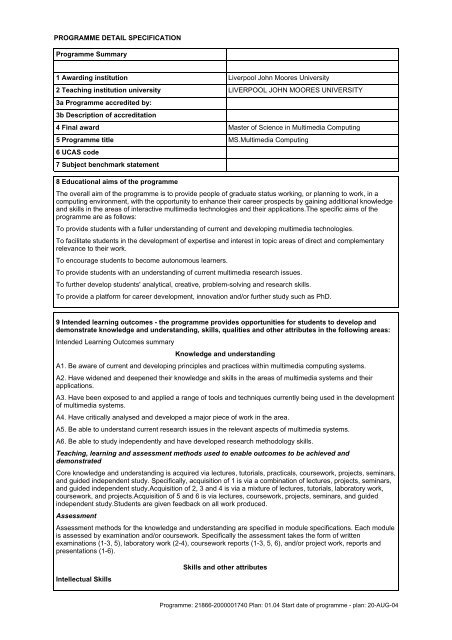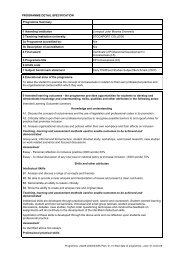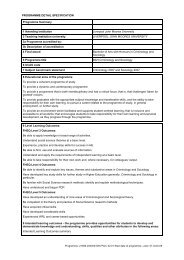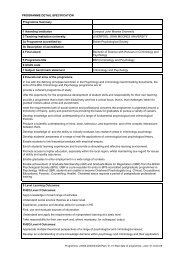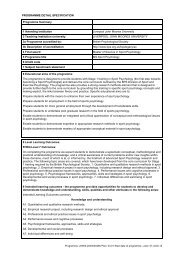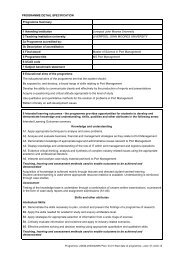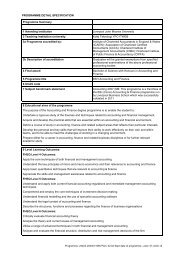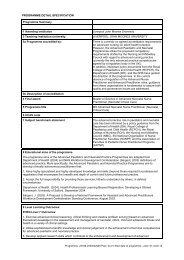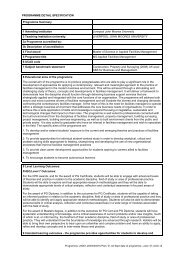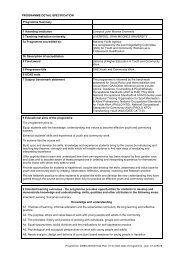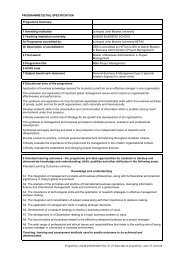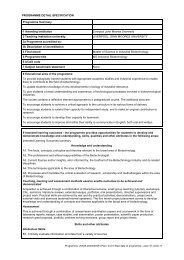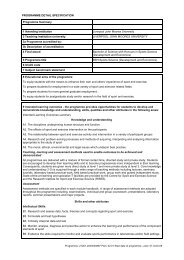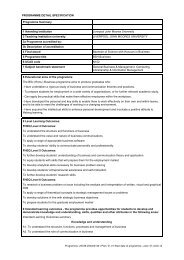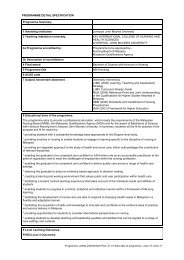Multimedia Computing - Liverpool John Moores University
Multimedia Computing - Liverpool John Moores University
Multimedia Computing - Liverpool John Moores University
Create successful ePaper yourself
Turn your PDF publications into a flip-book with our unique Google optimized e-Paper software.
PROGRAMME DETAIL SPECIFICATION<br />
Programme Summary<br />
1 Awarding institution <strong>Liverpool</strong> <strong>John</strong> <strong>Moores</strong> <strong>University</strong><br />
2 Teaching institution university LIVERPOOL JOHN MOORES UNIVERSITY<br />
3a Programme accredited by:<br />
3b Description of accreditation<br />
4 Final award Master of Science in <strong>Multimedia</strong> <strong>Computing</strong><br />
5 Programme title MS.<strong>Multimedia</strong> <strong>Computing</strong><br />
6 UCAS code<br />
7 Subject benchmark statement<br />
8 Educational aims of the programme<br />
The overall aim of the programme is to provide people of graduate status working, or planning to work, in a<br />
computing environment, with the opportunity to enhance their career prospects by gaining additional knowledge<br />
and skills in the areas of interactive multimedia technologies and their applications.The specific aims of the<br />
programme are as follows:<br />
To provide students with a fuller understanding of current and developing multimedia technologies.<br />
To facilitate students in the development of expertise and interest in topic areas of direct and complementary<br />
relevance to their work.<br />
To encourage students to become autonomous learners.<br />
To provide students with an understanding of current multimedia research issues.<br />
To further develop students' analytical, creative, problem-solving and research skills.<br />
To provide a platform for career development, innovation and/or further study such as PhD.<br />
9 Intended learning outcomes - the programme provides opportunities for students to develop and<br />
demonstrate knowledge and understanding, skills, qualities and other attributes in the following areas:<br />
Intended Learning Outcomes summary<br />
Knowledge and understanding<br />
A1. Be aware of current and developing principles and practices within multimedia computing systems.<br />
A2. Have widened and deepened their knowledge and skills in the areas of multimedia systems and their<br />
applications.<br />
A3. Have been exposed to and applied a range of tools and techniques currently being used in the development<br />
of multimedia systems.<br />
A4. Have critically analysed and developed a major piece of work in the area.<br />
A5. Be able to understand current research issues in the relevant aspects of multimedia systems.<br />
A6. Be able to study independently and have developed research methodology skills.<br />
Teaching, learning and assessment methods used to enable outcomes to be achieved and<br />
demonstrated<br />
Core knowledge and understanding is acquired via lectures, tutorials, practicals, coursework, projects, seminars,<br />
and guided independent study. Specifically, acquisition of 1 is via a combination of lectures, projects, seminars,<br />
and guided independent study.Acquisition of 2, 3 and 4 is via a mixture of lectures, tutorials, laboratory work,<br />
coursework, and projects.Acquisition of 5 and 6 is via lectures, coursework, projects, seminars, and guided<br />
independent study.Students are given feedback on all work produced.<br />
Assessment<br />
Assessment methods for the knowledge and understanding are specified in module specifications. Each module<br />
is assessed by examination and/or coursework. Specifically the assessment takes the form of written<br />
examinations (1-3, 5), laboratory work (2-4), coursework reports (1-3, 5, 6), and/or project work, reports and<br />
presentations (1-6).<br />
Intellectual Skills<br />
Skills and other attributes<br />
Programme: 21866-2000001740 Plan: 01.04 Start date of programme - plan: 20-AUG-04
B1. Demonstrate knowledge and understanding of multimedia concepts, principles and theories.<br />
B2. Use such knowledge in multimedia system modelling, requirements analysis and design.<br />
B3. Perform critical evaluation and testing for a multimedia system.<br />
B4. Deploy appropriate methods and tools for the development of a multimedia system.<br />
B5. Apply appropriate research methods to conduct multimedia system related research.<br />
Teaching, learning and assessment methods used to enable outcomes to be achieved and<br />
demonstrated<br />
Cognitive skills are developed throughout the programme.Specifically, skill 1 is developed through tutorial group<br />
discussion, teamwork, coursework, projects, and presentations.Skills 2, 3 and 4 are developed through<br />
laboratory work, coursework, and projects.Skill 5 is developed through coursework, projects, and guided<br />
independent study.<br />
Assessment<br />
Assessment of cognitive skills is through written examinations (1, 2), laboratory work (2-4), coursework reports<br />
(1-5), and/or project work, reports and presentations (1-5).<br />
Professional practical skills<br />
C1. Develop and evaluate a multimedia system.<br />
C2. Manage multimedia system projects.<br />
C3. Use a wide range of computing facilities effectively.<br />
C4. Work individually and/or as a team member.<br />
Teaching, learning and assessment methods used to enable outcomes to be achieved and<br />
demonstrated<br />
Practical skills are developed throughout the programme. Coursework and projects are designed to provide<br />
practical opportunities for students to work independently and in groups.Specifically, skills 1, 2 and 3 are<br />
developed through laboratory work, coursework, and project work.Skill 4 is developed through individual and<br />
group coursework, laboratory work, and project work.<br />
Assessment<br />
Assessment of practical skills is normally by coursework (1-4) and projects (1-4).<br />
Transferable / key skills<br />
D1. Use information technology, e.g. Web and Internet, for effective information retrieval.<br />
D2. Apply numerical skills to cases involving a quantitative dimension.<br />
D3. Communicate effectively by written or verbal means.<br />
D4. Plan and manage learning and development.<br />
Teaching, learning and assessment methods used to enable outcomes to be achieved and<br />
demonstrated<br />
Key skills are developed throughout the programme in a variety of forms.Specifically, skill 1 is developed<br />
through a combination of research-related coursework, guided independent study, and projects.Skill 2 is<br />
developed through study of technical methods, examinations, coursework, and projects.Skill 3 is developed<br />
through report writing for coursework and projects, written examinations, teamwork, presentations, and group<br />
discussion.Skill 4 is developed via the management of learning tasks and deadlines for coursework and projects.<br />
Assessment<br />
Key skills are assessed as part of coursework (1-4), projects(1-4), written examinations (2, 3), and presentations<br />
(3).<br />
10. Route/Pathway/Field requirements, levels, modules, credits and awards<br />
Study modes<br />
The programme is offered in full-time mode with the possibility of part-time attendance. The course normally<br />
lasts for one year for full-time and two years for part-time.<br />
Programme structures<br />
The programme is modular in construction. Modules are 15 credits (equivalent to 150 hours of study) for each<br />
taught module, with an individual project module of 60 credits. Full-time and part-time students normally study<br />
60 and 30 credits per semester respectively, and then undertake a project once they have obtained 120 credits<br />
from taught modules. There are core (compulsory) modules plus a number of option modules in each semester.<br />
Programme: 21866-2000001740 Plan: 01.04 Start date of programme - plan: 20-AUG-04
Award Requirements<br />
Master of Science in <strong>Multimedia</strong> <strong>Computing</strong><br />
Postgraduate Diploma in <strong>Multimedia</strong> <strong>Computing</strong><br />
Postgraduate Certificate in <strong>Multimedia</strong> <strong>Computing</strong><br />
For information about awards, see http://www.ljmu.ac.uk/Academic_Enhancement/121984.htm<br />
Level 7 Potential Awards on completion Master of Science<br />
Core Option Award Requirements<br />
7003COMP RESEARCH METHODS<br />
7008COMP PROJECT<br />
DISSERTATION<br />
7009COMP HUMAN COMPUTER<br />
INTERACTION<br />
7010COMP MULTIMEDIA<br />
TECHNOLOGY<br />
7011COMP MULTIMEDIA<br />
SYSTEMS DEVELOPMENT<br />
7013COMP ADVANCED<br />
MULTIMEDIA TECHNOLOGY (V.2)<br />
7004COMP DATABASE DESIGN<br />
AND TECHNOLOGY<br />
7006COMP COMPUTER<br />
NETWORKS<br />
7007COMP COMPUTER SECURITY<br />
7012COMP VIRTUAL REALITY<br />
7014COMP INTERNETWORKING<br />
7015COMP COMPUTER<br />
SUPPORTED CO-OPERATIVE<br />
WORK (V.2)<br />
7016COMP MULTIMEDIA<br />
DEVELOPMENT WORKSHOP<br />
7017COMP MULTIMEDIA<br />
DATABASE SYSTEMS<br />
7018COMP KNOWLEDGE-BASED<br />
SYSTEMS<br />
7028COMP WEB DEVELOPMENT<br />
TECHNOLOGIES<br />
7029COMP NETWORK SECURITY<br />
7030COMP SOFTWARE AGENTS<br />
7032COMP MOBILE COMPUTING<br />
7037COMP LOCATION BASED<br />
SERVICES<br />
7045COMP FORENSIC<br />
COMPUTING<br />
135 core credits at level 7<br />
45 option credits at level 7<br />
0 elective credits at level 7<br />
11 Opportunities for work-related learning ( location and nature of activities)<br />
12 Criteria for admission<br />
Other<br />
Applicants should normally have one of the following qualifications:<br />
Degree in <strong>Computing</strong> or <strong>Computing</strong>-related subject, including subjects with a significant core of computing, or<br />
Degree equivalent professional qualifications, or<br />
DipHE or HND plus a minimum of 3 years professional experience in <strong>Computing</strong>.<br />
Students with non-standard entry qualifications are also encouraged to apply.<br />
13 Information about assessment regulations<br />
14 Indicators of quality:<br />
15 Support for students and their learning<br />
16 Methods for evaluating and improving the quality and standards of teaching and learning<br />
Subject standards for all taught programmes of study are specified using an outcome based learning model.<br />
Attainment is measured against the standard and individual student performance is moderated at assessment<br />
boards. This involves both internal moderation (by LJMU staff and/or partner institution staff) and external<br />
moderation (by External Examiners). Internal annual programme self-assessment is informed by broad ranging<br />
student feedback, external examiners and academic staff who conduct module review. External quality<br />
assessment by Professional Statutory Regulatory Bodies and the Quality Assurance Agency for Higher<br />
Education confirms that standards are set at the appropriate level and that quality of learning opportunities are<br />
subject to continuing improvement. The quality of teaching is assured through staff review and staff development<br />
Programme: 21866-2000001740 Plan: 01.04 Start date of programme - plan: 20-AUG-04
in learning, teaching and assessment. Designated committees have responsibility for the oversight of processes<br />
wherein quality and standards are evaluated and improved.<br />
Please note: This specification provides a concise summary of the main features of the programme and the<br />
learning outcomes that a typical student might reasonably be expected to achieve and demonstrate if he/she<br />
takes full advantage of the learning opportunities that are provided. More detailed information on the learning<br />
outcomes, content, teaching, learning and assessment methods of each module can be found in the student<br />
module guide and course handbook. The accuracy of the information contained in this document is reviewed by<br />
the <strong>University</strong> and may be checked by the Quality Assurance Agency for Higher Education.<br />
17 Key sources of information about the course can be found in:<br />
Further details may be obtained from a series of handbooks for students that together provide comprehensive<br />
information. Detailed programme information is contained in definitive documentation for the programme. The<br />
Virtual Learning Environment (VLE) is increasingly used to provide module specific information.<br />
18 Progress Files<br />
Increasingly, academic guidance is provided within a framework of personal development planning linked to<br />
progress review.<br />
Programme: 21866-2000001740 Plan: 01.04 Start date of programme - plan: 20-AUG-04


